#obscure emotions
Text
A Little OC Ask List of Difficult to Describe Emotions.

Some emotions are difficult to explain clearly. Perhaps your OC has experienced one of these? Can they remember a specific example? If they haven't then can they imagine what it might be like to experience?
Sonder: The profound feeling of realizing that everyone, including strangers passing in the street, has a life as complex as one's own, which they are constantly living despite one's personal lack of awareness of it.
Opia: The ambiguous intensity of looking someone in the eye, which can feel simultaneously invasive and vulnerable.
Kenopsia: The eerie, forlorn atmosphere of a place that's usually bustling with people but is now abandoned and quiet.
Monachopsis: The subtle but persistent feeling of being out of place.
Jouska: A hypothetical conversation you compulsively play out in your head.
Altschmerz: Weariness with the same old issues that you've always had - the same flaws and weaknesses that you've been gnawing on continuously for years.
Greng Jai: A feeling of unwillingess to accept help from someone, out of concern for the trouble it might cause them.
Liberosis: The desire to care less about things than one does.
Dolce Far Niente: A feeling of pleasure from doing absolutely nothing.
Mauerbauertraurigkeit: The inexplicable urge to push other people away, even close friends, lovers or those that you trust.
Enouement: The bittersweetness of having arrived in what was once the future, seeing how things turned out, but being unable to tell (or warn) your past self.
Kuebiko: A state of exhaustion inspired by exposure to acts of senseless violence.
Exulansis: The urge to give up trying to talk about an experience, because other people are unable to relate to it.
Adronitis: Frustration with how long it takes to get to know another person.
Attriage: The state of having lost all control over how you feel about someone.
Wildred: The feeling of haunting solitude in extremely remote places.
Mudita: A feeling of joy at another person's good fortune.
Aulasy: The sadness that there’s no way to convey a powerful memory to people who weren’t there at the time.
Ioia: The wish that you could see statistics overlaid on every person you encounter, perhaps to check the strength of their compatibility, measure their trustworthiness, or even just know for certain how they’re really feeling.
Yeorie: A certain scent that has the power to sweep you back into memories of childhood.
Thrapt: Being awed at the impact someone has had on your life, feeling intimidated by how profoundly they helped shape your identity.
Dolonia: A state of unease prompted by people who seem to like you too much, which makes you wonder if they must have you confused with someone else — and feeling vaguely disappointed that they’re unwilling to spend the time it takes getting to know the real you.
Antiophobia: A fear experienced while leaving a loved one, wondering if this will turn out to be the last time you’ll ever see them, and whatever good-bye you tossed their way might have to serve as your final farewell.
Harmonoia: An itchy sense of dread when life feels just a hint too peaceful.
Dolorifuge: Something which brings about a feeling which banishes or mitigates grief.
Compunctious: Feeling remorse or regret, but wishing to avoid actually apologising.
Callosity: A lack of feeling or capacity for emotion.
Mimeomia: The frustration of knowing how easily you fit into a stereotype, even if you never intended to do so.
Pronoia: A strange, creeping feeling that everyone’s out to help you...
Awumbuk: A feeling of emptiness or heaviness after someone else departs.

#OC asks#OC ask meme#OC ask list#oc meme#ffxiv oc#oc development#obscure emotions#unusual words#ff14 ffxiv#ffxiv
41 notes
·
View notes
Text
Addleworth
"Are you okay?"
A question that's always asked
"Are you okay?"
A question with too many results
"Are you okay?"
Am I supposed to know?
"Are you okay?"
I don't know.
"Am I okay?"
A question in the back of my mind,
"Am I okay?"
To answer it must take time.
It's a question many know the answer
A question others struggle to answer.
So. Are you really okay?..
1 note
·
View note
Text
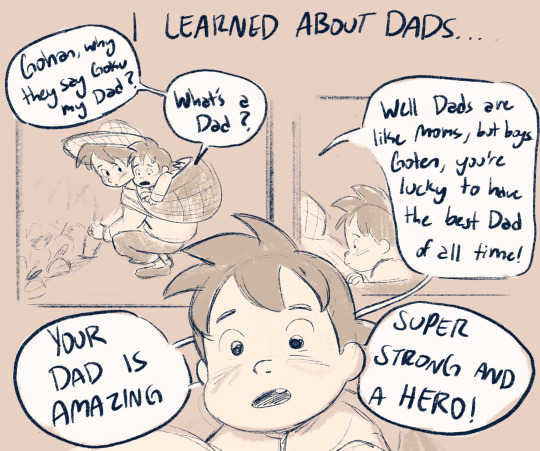
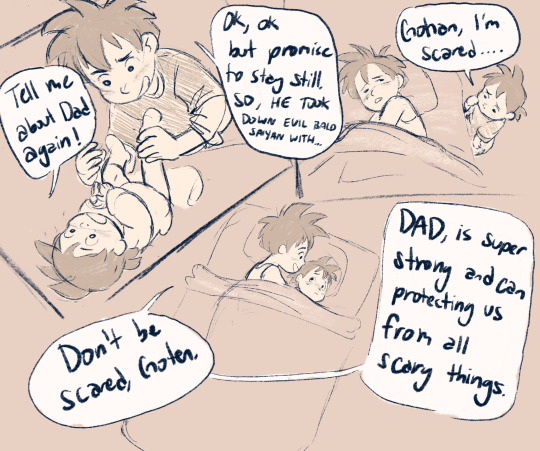
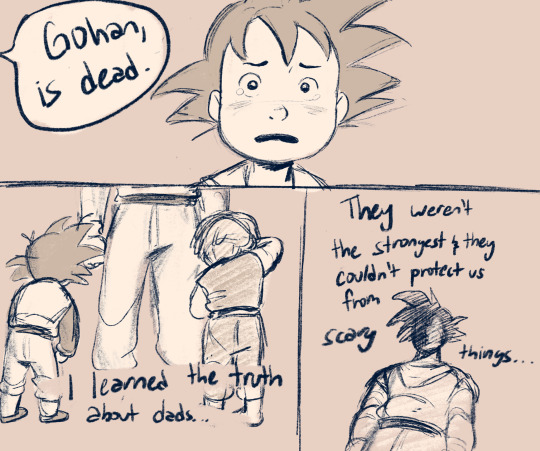
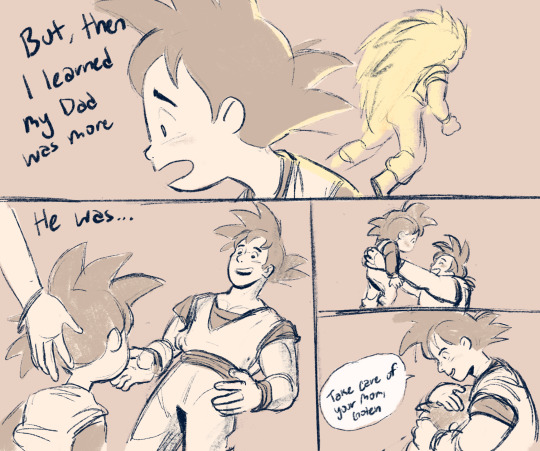
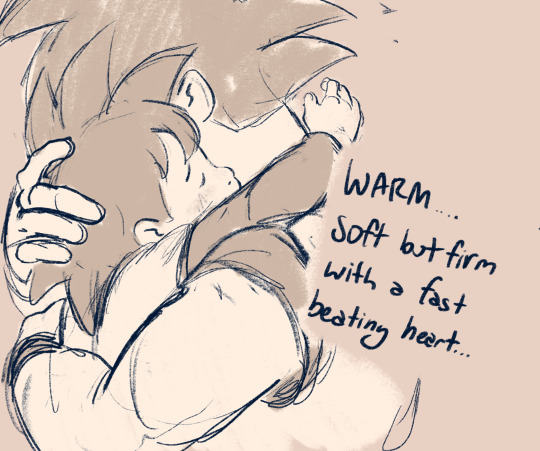

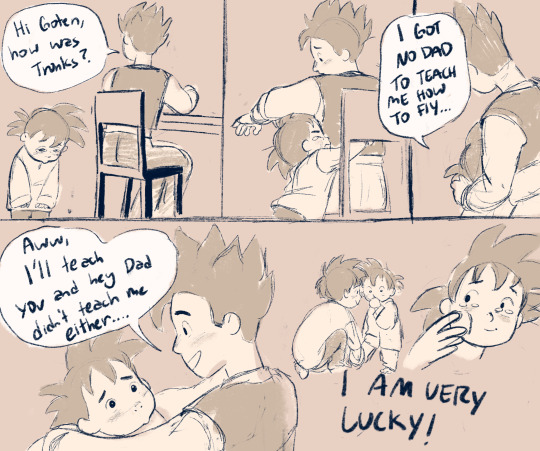
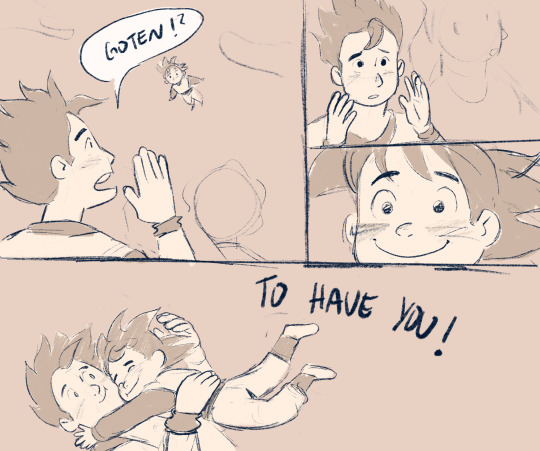
This is me wanting to draw that Gohan and Goten reunion we never got in the buu saga. Like both were dead and one thought the other to be dead.
This started cause I was talking to a friend of Gotens character in regards to Goku at first Goku is hyped up to him this untouchable heroic hero. He sees how everyone feels about him but he feels not much for his Dad other what he was told and he’s scared to approach. Then, reality kicks in his Dad isn’t that… Gohan is “killed” and Goten and Trunks and thrusted into the role of saviors of the Earth. Goten resents him but then… he learns that Goku isn’t none of that he’s real, super approachable, and awesome. It beat the stories he was told.
Then, he realizes he never felt he was missing that love because he had a lot of it. Gohan was always there for him making sure nothing was missing for Goten. Goten realizes he is very lucky to have Gohan. Anyway not me explaining my comic in the comments
#dragon ball z#Goten#gohan#goku#trunks#vegeta#my fart#FEELING EMOTIONAL ABOUT CARTOONS#also like hug such a reference to chichi kogusa hug#those that catch it ya read the obscure mangas I read
1K notes
·
View notes
Photo

Clarity
#blackandwhite#portrait#moody#atmospheric#obscured#woman#blind#emotional#sentimental#bw#female#insensitive#insensible#erase#photography
2K notes
·
View notes
Text
hanguang-jun...
lan wangji in ace attorney!! turn on sound 🔊 / traced over edgeworth's sprites :) more info below the cut ↓
also including a bonus Happy Wangji that i couldn't fit into the video!

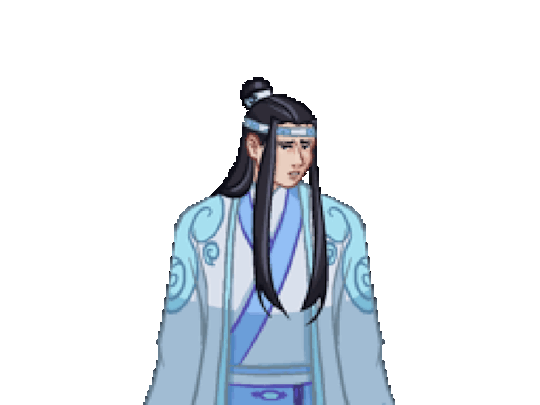
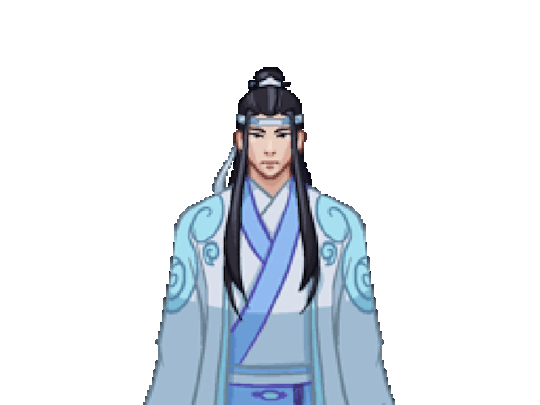


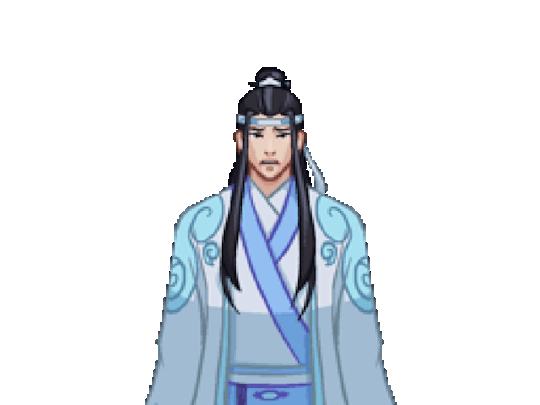

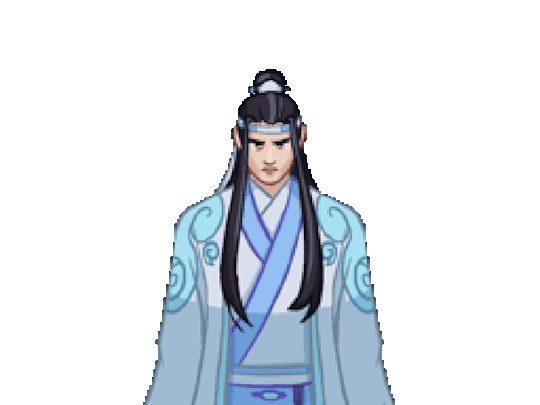


his share code is YCNKBA! the music used is Recollection -- Light and Shadow of the Film Studio. I thought it had a nice, contemplative feel, between Suspense, which was too intense for the scene, and Heartbroken Maya, which was too sad. the wwx/jc/lwj reunion scene is truly sososo interesting in every adaptation.
→ masterpost here! ←
#my emotional support longterm semi-obscure crossover animation series based off of a throwaway joke#i poured all my thoughts about the jc/wwx reunion into my yiling patriarch shitpost just like. scroll a bit down on my blog#would love for jc to have more expressions in this but sadly if i have to go back and edit a finished piece i spontaneously combust 😔#lan wangji and miles edgeworth autistic kings#its very funny to me that my sprite with the most emotions yet is the character that famously doesnt emote#i used the internet archive EXR translation again#edited some of the dialogue cause it didn't sound very natural/was too long#but i also found out that the entire series of official english mdzs books are on the internet archive?? straight up??#by 2042 ill have animated every single character and recreated the entire novel in objection.lol so watch out for that lmao#mdzs aa au#mdzs#aa#lan wangji#mo dao zu shi#grandmaster of demonic cultivation#the grandmaster of demonic cultivation#mxtx#wangxian#jiang cheng#wei wuxian#twin prides of yunmeng#ace attorney#animation#art#my art#pixel art#objection.lol#flashing tw#flashing images tw#flashing cw
264 notes
·
View notes
Text

Genevieve Bujold on the set of King of Hearts, April 1966
#my emotional support mental asylum ballerina 🩰#i know this was way too obscure and early in her career to warrant an oscar nom#but she deserved one#i have never seen a better portrayal of unadulterated sweetness and innocence on screen#to think only three years later she'd tear burton to fucking SHREDS!#genevieve bujold#king of hearts#sixties sweethearts#*
113 notes
·
View notes
Text
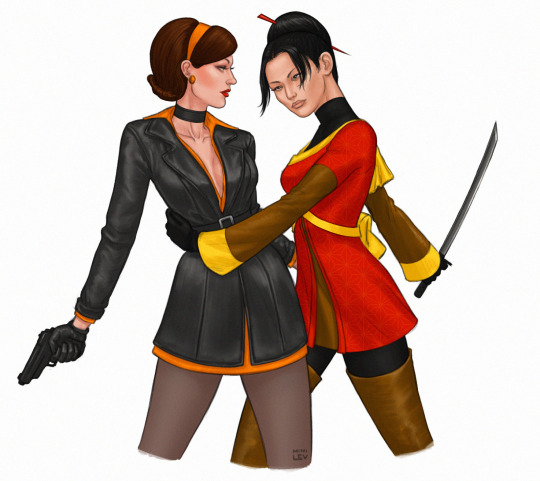
#femslash feb bingo#enemies to lovers or whatever#one of my obscure childhood f/fs#i was like 12 i was so confused about my emotions when i saw them together i didn't know about shipping back then#nolf2#cate archer#no one lives forever 2#my art#femslash february
38 notes
·
View notes
Text
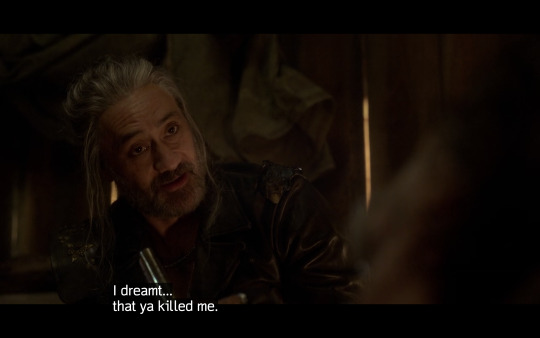
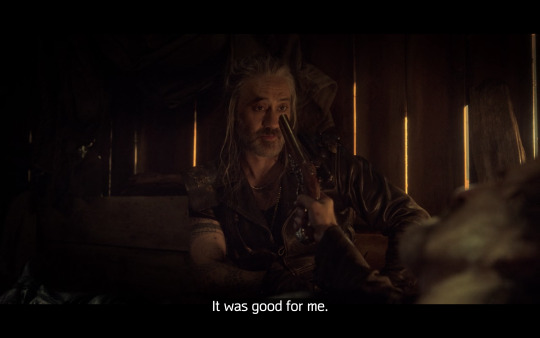
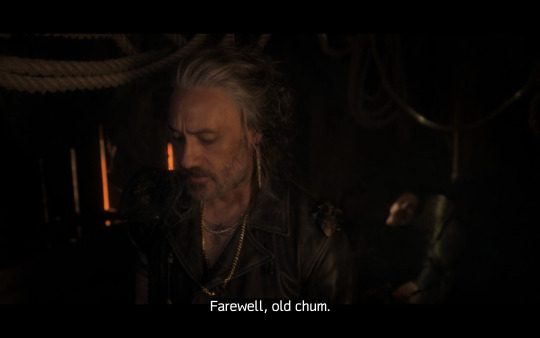
So I've only watched 2.1, 2.2., and 2.3 once each so far, but I can already tell the music choices are going to wreck me this season. I figure lots of people will have things to say about the use of Kate Bush in 2.3, so I want to focus on the second movement of Beethoven's Symphony #7 in 2.2, "Red Flags."
First, this movement has been a banger since it existed: at its first performance, the audience demanded that the second movement be repeated after the symphony concluded. It's a funeral march, and per the notes accompanying the Deutsche Kammerphilharmonie of Bremen's gorgeous recording, it was likely heard as responding to collective grief:
The premiere performance of Beethoven's Seventh was at a benefit concert in Vienna in December 1813 for wounded soldiers and their families. It came only two months after the Battle of Nations near Leipzig. The German name is "Völkerschlacht" (Slaughter of the Peoples), one of the most catastrophic wartime events in human history. It also marked the liberation from Napoleon's forces. The sad, beautiful quality of this piece makes it very different from the other three movements of Beethoven's Seventh. Endlessly mournful – but also uplifting, it is still played at funerals today.
For those of us who were in music school at a certain point in history, it is also the soundtrack for characters experiencing suicidal ideation, courtesy of the 1994 film Immortal Beloved.
Its use underpinning the conversation between Ed and Izzy is self-explanatory: Ed's way of expressing self-loathing is to goad the people around him to hurt him. He feels a kind of ambivalence toward his own life that we saw last in OFMD's pilot, where Stede cannot firmly answer Oluwande's question, "Do you want to live?!"
But we hear the first notes of Beethoven before that scene ever begins.
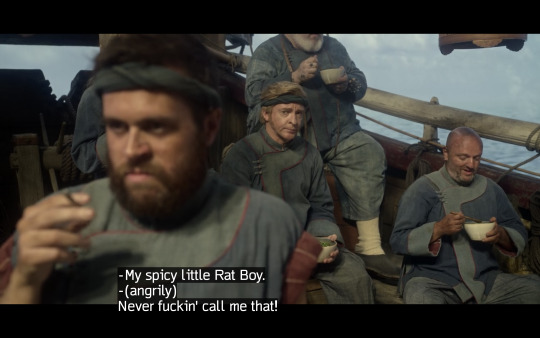

That the music begins here, rather than when Ed enters the hold to press Izzy into killing him, highlights as much as anything we've seen so far how traumatized Lucius is: not just by being pushed overboard, but by all the trafficking and abuse he experienced before encountering his former crewmates, which he barely starts to detail in this episode. "If I start, I don't know what's going to come out." The stories Lucius shares may have an over-the-top quality, but they're scored like tragedy.
#tw suicidality#i have a lot to say about izzy taunting ed for being too afraid to kill himself#in order to obscure the fact that he is also too afraid to kill ed#and that it's not a matter of principle#and that yes ed is bloody well scared and miserable#and that part of what he needed was permission to feel those emotions#and maybe also that in some way he feels like his life ended when he tried to commit to being blackbeard instead of ed#but there might be other times for that#edward teach#izzy hands#lucius spriggs#ofmd#our flag means death#ofmd s2 spoilers#beethoven
67 notes
·
View notes
Text








Some system struggle related userboxes, based on ones we personally experience
(P.S. As a reminder, all systems will have unique experiences overall, and some of the individual things you may experience that make you nervous may actually be more common than you think. It's normal to worry about these things as well. At the end of the day, we are all different, and we don't need to fight to justify our validity in existing, or the validity of our experiences. We are here because of trauma, we don't need to justify our existence to anybody. <3)
[Text 1: This system struggles with worrying that they need to justify splits and alters existing]
[Text 2: This user gets anxious when the rest of the system goes quiet while fronting]
[Text 3: This system has many alters without clear or active roles and is afraid that it makes them less valid]
[Text 4: This system's alters worry about not being able to fulfill a clear role]
[Text 5: This system gets anxious about unusual and/or frequent splits]
[Text 6: This system is afraid that their experiences aren't normal and that others will judge them]
[Text 7: This system is still working on learning self-acceptance no matter their experiences or how their system functions]
[Text 8: This system struggles with worrying about faking but is getting better at avoiding those thoughts and worries]
(Like/reblog/credit if used! ☆)
[Read our DNI before interacting or using, NON-TRAUMAGENICS AND SUPPORTERS FUCK OFF]
#Btw our ''unusual splits'' we worry about are when we get more than 1 at once or canonmate splits ✌#Both of which! By the way! Are not actually as obscure or odd or uncommon as we have feared!#It's actually not that uncommon to have canonmate splits as we've found#Plus we're fairly isolated and don't indulge in much media and sometimes emotional problems can easily be helped by people from our canons#So it makes sense for us#Also gaining more than one alter at a time from splits is I'm pretty sure actually pretty common#mod hels [♦️]#userboxes#userbox#did#osdd#didosdd#system stuff#actually traumagenic#endos dni#Especially on this cause guess what endos are a huge cause of actual systems worrying about their validity lol
653 notes
·
View notes
Text
Windu and Quinlan's dynamic can be something so personal
#reading star wars jedi comics and damn the way they understand each other because of how close they both are to the dark side#the way Quinlan looks up to Windu and the way Windu teaches him and spars with him and helps him balance out his emotions#just how supportive he acts and how understanding he is towards Quinlan especially after the fact that Quinlan lost him memory#and had to find his way back to the order and adjust to this despite how actually tragic the memory loss was for him#(and thats a whole other thing)#i need to blow up about it a thousand times#im just like ken his job is beach my job is reading obscure comicbooks from early 00s and be annoying about them
61 notes
·
View notes
Text
every time scott lang appears in someone else’s movie all he does is show up, look confused, make goofy jokes, smile, baffle everyone, and be extremely useful
#mcu#scott lang#ant man#cacw#avengers endgame#what if your deus ex machina was an ex-con who loves his daughter and has the exact obscure gizmo you need#total wild card. integral to the plot yet almost completely removed from the central emotional conflict#the blip lasted five years because that’s how long scott was trapped in the quantum realm#THAT’S his impact#and then he turned into a baby and an old man and pissed his time suit
31 notes
·
View notes
Text
This fear... It's... It's mine?
I am unfamiliar with...whatever this thing is, Wayfinder. But, I do not like it.
I do not like it at all.
#guild wars 2#gw2#this has to be one of my favs from her#we get some good emotions#this is actuly waht makes her and my wayfinder bond#soto#gw2 soto#soto spoilers#secrets of the obscure#gw2 peitha#peitha#gw2 audio
56 notes
·
View notes
Text
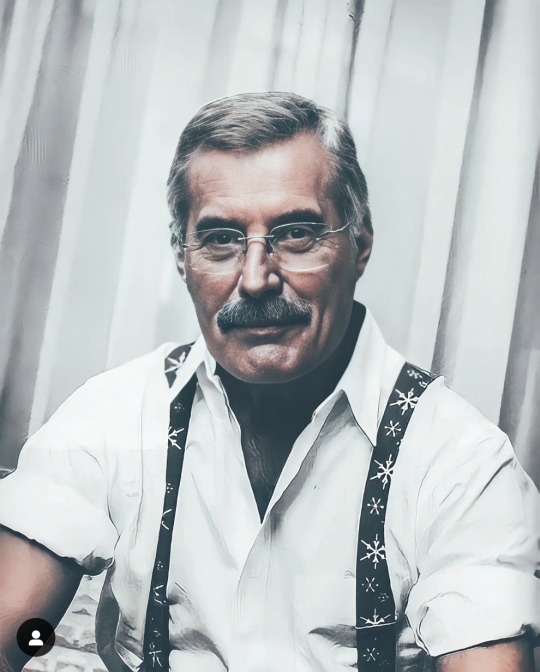
This artist, Alper Yesiltas, uses AI to help create portraits of famous people who died young, and what they would look like today had they lived.
Here is the portrait of what Freddie Mercury might have looked like at 77.
#freddie mercury#queen#bicon#bi celebrities#this makes me really emotional#also I tried to directly link to the post but Instagram puts an ugly play button right over the middle of the image#even though there’s nothing to play#and I couldn’t let that obscure Freddie’s face
244 notes
·
View notes
Text
Obscure: Chapter 11
Chapter 11 of Obscure, novel-length interrogation whump about a rebel leader who can erase memories with a thought, an interrogator who can see inside his subjects’ minds… and the connection they share that neither of them suspects.
Masterpost | the Mind Games universe | Read the completed novel on Patreon
---
Elias
The interrogation rooms must not have been cleaned on a daily schedule, because the next morning, Elias smelled his own sweat hanging in the air. The table was smudged with the nervous grease from his own hands. It cut the reflection a little, made it more bearable. He could have done without the sweat, though.
But if he was going to make wishes, he might as well wish himself back home.
Kirill sat across from him. He had dark circles under his eyes, and the lines around his eyes and at the corners of his mouth were more pronounced. But those pale eyes themselves were daggers newly sharpened to a fresh point.
Kirill sat up straighter, inhumanly straight, like he was trying to blend in with the furniture with all its cold right angles. His breath came in a steady rhythm, like there was a machine in his chest breathing for him. The sound was hypnotic.
“What’s the mask this time?” Elias asked. “What game are we playing today?”
“No games,” said Kirill. “Not anymore.”
“You keep saying that. But we keep circling around to the same thing.”
As always when Kirill was in the room, a slow but steady trickle of fear-memories leaked out of him. A constant small betrayal on the part of his mammalian brain. Kirill might have been able to turn himself into a machine at will, but Elias didn’t have that ability. No matter what he had thought at first, in his hubris, with his hours of practice at desensitizing himself to his own grief.
“We were done with games days ago,” said Kirill. “If you think we’ve been playing, you haven’t taken my threat seriously enough. Should I show you a picture of your son, here in headquarters, to prove I mean what I say?”
The thought stopped Elias’s breath. But no emotion rushed out of him. A second later, when his chest filled with an inner warmth, he understood why. Negative emotion brought out the memories, Kirill had said. The thought of seeing a picture of Sammy, alive and grown up… that was the fulfillment of fifteen years of hope. Kirill could get nothing from that warmth.
The fear hit a second later. Because his dream had been to see his son happy and healthy, and if he was either of those things now, it was only because he was ignorant of the threat hanging over his head. Elias wanted to see him, but not like this. Not as a hostage.
Not as a PERI resource.
“Would you like that picture?” Kirill asked. His voice was strangely empty, even for him. Like someone had scooped out every ounce of humanity in him, and the thing in front of Elias now was what was left.
Elias shook his head.
“Do you still think we’re playing games?”
Elias shook his head again.
“Then let’s get started,” said Kirill. “You asked what part I was playing today. I’m not. I have a better way of getting emotion from you now. All I need to do is mention your son and what will happen to him if you stop giving me what I need, either through your memories or through what you tell me aloud.”
One more time, Elias shook his head. “Of course you’re playing a part. This isn’t who you are.”
“This?” Kirill looked down at himself, like he was trying to see what Elias saw. “There is no this. I’m not being anything.”
“Exactly. You’re nothing right now. No one is nothing inside.”
“Still looking for the answer to your question? You’re going to be disappointed. Anyway, we’re not here to talk about me. And we’re not here to play. I’m going to talk to you about your son, and you’re going to give me the information I want. If you’d like things to move faster, you can speak aloud, and spare yourself the grief and fear I’ll have to evoke otherwise. If I stop getting anything from you, I’ll take you to your son, and I’ll hurt him.”
The fear-wound tore a little wider, bled a little more. Nothing Kirill could use—Elias was certain of that. A face from a horror movie poster when he was a child, on one of the family’s big trips into town. They had always drawn looks—a dozen adults and twice as many children, clustered together in one big herd. Half of them small-mouthed and wide-eyed like a gaggle of country mice. The other half behaving like wild things, like the trip out was an excuse to let out the sides of themselves they had to keep buttoned up at home.
Their parents had let them, so long as they didn’t let their powers show—that was the only unbendable rule. The children had run around like rabid animals, grabbing all the unfamiliar brightly-colored things with their grubby hands, smearing fingerprints all over the ticket counter and the movie posters. The adults—eager for a chance to let loose themselves—had laughed too loudly and worn impractical clothes they never wore at home, and poured liquid from small metal flasks into their extra-large sodas.
Max had been one of the country mice. Elias had watched the wild things longingly, but had stayed with Max, letting him clutch his hand and hold him in place.
“We’re not here to talk about your ghost boy,” Kirill said, his voice sharp.
Elias blinked away the past. “We’re not here to talk about Sammy, either. Not really.”
“Your son is a means to an end. Focus on him. Think about the hands of the child you remember. How will it sound when those small fingers snap?”
Was Kirill’s cruelty another mask he could put on and take off at will, or was it part of who the man was underneath? There was no point in asking—no point in wondering, even, when he would never get an answer. Elias clung to the thought anyway, because any distraction would do.
But no distraction could hold up to the image Kirill’s words evoked, or the sound in his imagination of a tiny, delicate finger bone snapping. Sammy’s hands weren’t that small anymore, of course. They had to be the size of his own by now. Elias knew that intellectually. But when he thought about Sammy’s hand, he pictured the hands of an infant, of a toddler, of an eight-year-old. When he imagined them broken, those were the hands he saw.
Sick fear. Helpless rage. A river of memory overflowed its banks. A gushing wound, memory-blood pooling around him, bleeding out the entirety of his son’s history. In front of Elias, Kirill rocked back slightly as eight years of memory flooded him at once.
“The branches of your network,” Kirill said, his voice tight, his unfocused eyes darting back and forth like he was in the grip of a nightmare. “The command structure. Names and faces.”
Elias couldn’t control the flow. It carved a new path in his mind, veering away from Sammy’s childhood, passing through the details of the network he had painstakingly built over the past fifteen years. He tried to steer it back, but the memories were a river, and they flowed through his grasping fingers like water.
The names and faces Kirill had demanded poured from him and straight into Kirill’s brain. A rush of guilt followed. He was giving Kirill everything. And his people would suffer for it, the people had trusted, who had agreed to work for him despite the danger. The future children they could have rescued, the future Sammys, they would also suffer.
The river grew faster, stronger, drawing a soft noise of protest from Kirill. But Kirill’s mouth, curled in a hard smile, was satisfied, his hunger slaked.
Guilt was an emotion. Emotion made the memories come faster.
He breathed in. Breathe out. He stared his grief straight in its wide and helpless and relentlessly hungry eyes, and resisted the urge to reach out and throttle the creature. That wouldn’t help.
Fighting grief never killed grief.
Fighting fear never killed fear.
Fighting pain never stopped the pain from coming. It only multiplied it —the pain that couldn’t be stopped, times the pain of failing to stop it.
His son was in danger. But he had faced that before. He had stared that monster down, and it had blinked first.
His people would suffer and die because of his unwitting betrayal. But he had lost people before. He could still remember the feeling of hot blood on his hands, the thick and earthy tang of it in his nose, pleading eyes going soft and glassy. He could still remember the heat of the flames, and the dying screams of everyone he had almost loved.
Almost everyone. That last loss had come later.
So many losses. And he had survived them all. He had found a way to push the torrents of feeling down, to fight his way back to dry land rather than letting the current hold him under. Otherwise, he would never have survived.
Inhale for four.
Exhale for four.
Inhale.
Exhale.
The flow didn’t stop. But it slowed. The memories came in jagged bursts. Not a current, but the fitful expulsions of a broken faucet.
“Focus,” Kirill urged, and Elias did. He focused on his breath—inhale, exhale. He stared into Kirill’s pale eyes and imagined himself staring down his grief.
But Kirill said, “Sammy,” and Elias saw his son’s face. No amount of focus on his breathing could banish the memory of those eyes or those pudgy child cheeks.
“I’ll start with the little fingers,” said Kirill. “They hurt the most when they break.”
And then, “The locations of your safehouses. With addresses.”
His memory lurched. The river surged down its new path. The images hovered half-formed in Elias’s mind, like vomit struggling to come up.
But if Elias couldn’t stop the flow of memory, maybe he could choose where it went. He couldn’t keep Sammy out of his mind, so he stopped trying. He thought about those cheeks, about his dark and solemn eyes. Those hands, with their perfect fingers Kirill kept threatening to break. A small face contorted in fear.
“The safehouses,” Kirill said. Still colorless, empty of feeling, but Elias imagined frustration lurking underneath. He imagined it because it made him feel like he was winning. He needed to feel like he would win, like he could win, or he would stop trying.
Safehouses. House. Safe. The little house he and Lisbeth had owned together. Her with her hands on her swollen belly, looking doubtfully down the basement stairs. He’ll fall as soon as he starts walking. We should keep the basement door locked—get a padlock and just never open it. We never go down there anyway. Him telling her she was being ridiculous to close off an entire room of the house, an entire floor. He said it with a smile on his face, so she’d know he was joking even though he wasn’t, because he never knew what would hit her wrong these days. He felt a tiny squirm of unease in his belly, gratitude that she had been the one to say it and not him, because he had been eyeing those stairs with trepidation for weeks now.
“Clever,” came Kirill’s impassive voice. “Now show me your network. Where do your people hide themselves?”
His people, his family, his son. He kept Sammy’s dark eyes fixed in his mind—the best memories, the worst, anything with enough emotion to keep the current from changing course.
But Kirill’s words lodged themselves in his mind. His network. Hiding. He pictured cabins hidden deep in the woods—
But there had been a different network once. And a different kind of hiding, one he hadn’t thought of as hiding. He had thought they were all family, and all they needed was each other, and it was as simple as that. He hadn’t understood the danger that had driven all his mothers and fathers to buy a hundred acres out in the middle of nowhere. Not until the danger had come knocking with a lit match in its back pockets.
For decades, since long before the loss of Sammy, he had held those memories at bay. He had forced them down, burying them deeper and deeper, piling more and more dirt on top. He had buried them the way none of his family had gotten the chance to be buried. They had burned instead.
The memories came out in his nightmares sometimes, once or twice a year, no more than that. The memory of fire, the stink of burning wood and burning flesh. Or, more rarely, happy dreams—chasing frogs in the marsh, picking flowers in the meadow, he and his hesitant shadow. He and Max, who Kirill had called the ghost boy.
Was his face really that blurry in Elias’s memory now? Had Elias buried the memory of him that deeply? He hadn’t thought so. But Kirill had sifted through his memories with the deft skill of a long-time prospector panning for gold, and Max’s face was the one thing he couldn’t see.
If there was enough emotion in the memory of Max for that, there was enough emotion in that memory to hold his thoughts in place.
All he had to do was let it in.
Kirill wanted his network. But his family had functioned in much the same way. Protecting each other, using their abilities for the good of the whole. Keeping the children safe and oblivious. That long-ago home—that was his network. That was the network he would give Kirill.
Kirill wanted safehouses. He wanted to know where Elias’s people hid. They had hidden in houses they had built themselves, in a wilderness of marshlands and overgrown meadows. The electricity had gone out with every storm. Sometimes it had taken weeks to come back on. They had eaten canned food and built fires for warmth, and huddled together under hand-sewn blankets, everyone all together in one house. to conserve heat.
They had lived like animals, Max had said later—We’ve been living like animals all our lives. Even before we had to run. I’m tired of it. Aren’t you tired? But Elias had never seen it that way. He hadn’t felt deprived, except for brief sharp pangs on those trips into town, glimpsing children who treated going to the movies or out for ice cream as ordinary.
He had never felt embarrassed by his hand-sewn clothes, not like some of the others had. The kids in town had blue jeans that looked like the ones in the movies, and shirts with cartoon characters on them. But Elias had pants rugged enough that he could climb the tall tree at the center of the marsh and never tear them. He had picked out the fabric for his favorite shirt himself, and sat with Mama Charisse in her living room as she had sewn it without using her hands to move the needle and thread.
“Your network.” Kirill’s voice was distant now, faded, compared to the vibrancy of Elias’s memories. Even so, Elias felt the pull of the current guiding him closer to the present day, closer to Kirill’s voice.
Thinking about his home wasn’t enough.
So Elias unburied the dead.
Mama Charisse hadn’t been what the outside world would have called his real mother, the one whose body he had grown in and pushed his way out of, the one he had shared a house with when he wasn’t sleeping over at Max’s house. That hadn’t mattered to him. Every adult had been his mother or his father. Every child had been his sister or his brother. It confused him, in the books he read and the movies he watched and the families he saw in town, how small the families were, and how many walls they placed between each other.
He had called his real mother by her name, the way he did with all the others—the adults had wanted that way, hadn’t wanted divisions based on blood. She had been Mama Jessie. She had smelled like oranges and sunlight and could make plants turn green in the middle of winter with just one touch. She had died screaming, like all the others, when their home had burned.
Max had wanted to go back to look for survivors. Elias had said no. He had said PERI could still be there, waiting for them to come back. And that might have been true. But it wasn’t the reason for Elias’s refusal. Elias hadn’t wanted to risk seeing the charred bodies of the dead.
He remembered Mama Jessie’s arms around him, the smell of her, the roughness of her hands. All the things he had buried for so many years, so he could sleep without nightmares. Those first few weeks after they had run, he hadn’t slept, because he had seen her dying every time he closed his eyes, her and all the rest. And if he didn’t sleep, he couldn’t take care of Max. He had buried the dead so he could tend to the living.
He pictured his father, Papa Graham, with his bushy beard and his long, long legs. Elias’s eyes had always been too serious, or so everyone had told him, but Papa Graham’s eyes had always been smiling. He smelled like the cigars he bought in town and smoked when he thought Mama Jessie wasn’t looking.
And then there was Max. The ghost boy.
They had been born the same week of the same year. The family had called them twins. Mama Kelly had called them photo negatives of each other, one with black hair and black eyes, the other with pale, pale eyes and hair so light it was almost the white of snow.
They had shared a crib as babies, on the days when their parents couldn’t get them to stop crying. Max had stopped crying when Elias was there to take care of him, or so the family legend went. Elias had stopped crying when he had Max to take care of.
They had talked in full sentences to each other before they said a word to anyone else. They had learned to crawl together, walked together, steadying each other with chubby hands firmly clasped together. They had been two halves of the same person. First twins, mirrors, photo negatives. Then, once they were old enough to explore, they were no longer mirrors but opposites, each of their differences perfectly complementing the other.
They had both been serious—too serious, Mama Kelly had said—but in different ways. Elias had been the protector, Max the one who needed protecting. Elias was the hard shell, Max the soft, defenseless creature inside.
The adults had shaken their heads over Max, wondering who he would be what he would do when he no longer had Elias to rely on. It hadn’t been until years later that Elias had realized their worries had been misplaced. They should have asked themselves what Elias would do when he no longer had someone to protect.
He would set out to protect the whole world—that was the answer. Or as much of it as he could reach.
Maybe what he had created hadn’t only been a response to Sammy’s death after all.
The adults hadn’t needed to worry about Max. Max had grown beyond Elias in good time. He had formed his own opinions, gained the strength and the conviction to make his own decisions. He had been the one to let go first, not Elias. It had been Elias who had tried to hold on. Elias, in the end, who had struggled to let go.
The memories of their last fight were the ones that came into his nightmare most frequently. But today, Elias unburied the deeper memories. Like wine or cheese, they had grown all the more potent from their years in the dark.
Like Elias urging Max to climb a tree after him. Elias didn’t shimmy up trees as a natural instinct, the way some of his more reckless brothers and sisters did. He had studied the tree at the center of the swamp for weeks, climbing up little by little and then back down again, a little further every day. Gauging its weaknesses, formulating his plan of attack. He had shared his acquired knowledge with Max, but Max preferred to stay on the ground.
Maybe Elias should have let him. But he had been a child, and he had wanted to share the view. And eventually, he had talked Max into it. Max had never been good at saying no to him, in those days. Elias hadn’t realized his mistake, not until he was safely on the ground again, staring up at a wide-eyed and terrified Max.
He’d had to call Papa Oleg in the end, and asked him to bring a ladder, like someone in a book calling the fire department for a cat caught up a tree. He had apologized to Max for not knowing how to get him down. That, in his mind, had been his failure—and an unforgivable one. It was his job to get Max out of any trouble he could get him into.
That early failure had done nothing to inoculate him against his more permanent failure later.
He lingered on the end of the memory, the feeling of his small arms around Max’s shaking body. After a moment, he realized the flow of memory was less like a rushing river now, and more like being immersed in a small and warm natural pool, out of the flow of the current.
The current had stopped. Without Kirill’s reminders, the sharpness of the emotion had faded.
Kirill must have noticed. Why hadn’t he said anything?
Elias let the memory fade. It drained away, leaving him out of breath from all his work digging up graves.
Kirill wasn’t sitting across from him anymore. He had his back against the wall. His eyes wide and desperate. In those eyes, Elias saw—only for a second—the eyes of a small boy trapped up a tree.
“A clever strategy.” Kirill’s voice was thin and thready. If it was part of a persona, Elias could figure out what.
“I can see you still aren’t ready to cooperate,” Kirill said in the same tone. “I may need to put you in a room with your son after all.”
The threat lacked sharpness. Kirill’s voice wobbled, an overcooked noodle where a knife should have been.
He stumbled out the door, leaving a startled Elias alone.
Elias had won a victory. He just wished he understood why.
---
Tagged: @cakeinthevoid @suspicious-whumping-egg
Ask to be added or removed from taglist.
#whump#whump novel#my writing#my writing: Obscure#my writing: Mind Games#interrogation whump#superpower whump#emotional whump
10 notes
·
View notes
Text
Maybe I journalize to organize my feelings and write down important things that happened so I can remember and look back on them. Or maybe it’s the prospect that someday after I die someone will find those journals. The thought is both mortifying and exciting. Can you imagine? After you die and having written so much in a journal that you leave a piece of yourself behind in an obscure small way? It’s not even certain that those journals won’t be thrown away or forgotten, but imagine. After you die and the journals are intact think of the possibilities! Maybe a grand-child or someone in the far future family will come across the journals in some dusty bin tucked away in the far corners of the house and read about you and get to know you that others could never. Get to know you despite not being there. Or maybe in the far future when humanity ends, or the apocalypse occurs and humanity has to rebuild itself, the future civilizations will come across your journals and get idea of what life was like before. Can you imagine? *shaking you* can you imagine that ordeal? If being known after you’re long gone? Of someone reading your most intimate thoughts and never having actually met you? Maybe the journal will be tossed to some donation store and someone will come across the journal and decide to take it home. To continue living on through a journal that may be found. Maybe these moments are too embarrassing to share with those around me, I could never show them my journal, those memories may be important to only me, my daily rambling, and rants, and perhaps they’d be worth burning to erase that, but in the future after you die isn’t it mortifying and exciting that someone you’ve never met read them? That far future historians will see your journal as a historical piece?
#journaling#emotions#late night#late night thoughts#maybe I won’t be famous or known for something#but maybe I could be known to one person in an obscure kind of way
31 notes
·
View notes
Photo
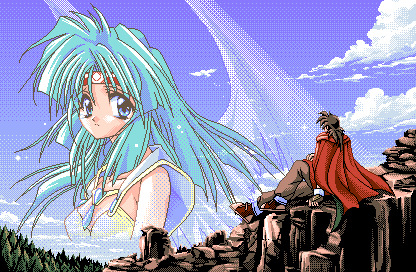
doradora emotion seihaiden
379 notes
·
View notes